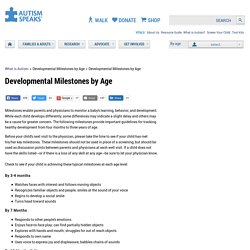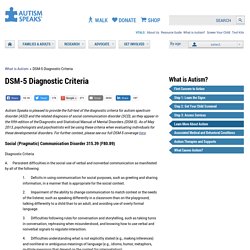

Aps for Sen. Dillan’s Voice. An Error Occurred Setting Your User Cookie. SGD Overview. Pecs. Useful tips and apps. Section 5. Science/Find Resources & Programs/Autism Treatment Network/ATN Tool Kits. Behavioral challenges are a common problem for children with an autism spectrum disorder (ASD).

Many children with ASD have challenges managing certain behaviors such as aggression or not following directions in addition to experiencing limitations in communication or social skills. This tool kit is designed to provide parents of children with ASD with an overview of in-home strategies as well as tips to teach and increase desirable behaviors and decrease behavior problems. This tool kit also provides caregivers with an overview of professional behavioral treatments that families can seek out from qualified professionals. ATN/AIR-P Introduction to Behavioral Health Treatments Anyone can download ATN/AIR-P Introduction to Behavioral Health Treatments for free here.
"These materials are the product of on-going activities of the Autism Speaks Autism Treatment Network, a funded program of Autism Speaks. Autism Apps. Section 5. An Introduction to PBS. Developing and Delivering Digital Behavioural Interventions. We are a research team based at the University of Bath, funded by The Leverhulme Trust to complete exciting new research developing technology to support the writing and delivery of Social Stories™.

What are Social Stories™? Social Stories™ are short stories, written in a specific format and style that aim to accurately describe a context, skill or achievement (dinner time, bath time, waiting in line for example). They provide a supportive visual tool to help children better understand what is happening during certain situations that they might find confusing and/or distressing. Research has demonstrated that Social Stories™ can be an effective intervention for supporting people with Autism Spectrum Disorders (ASD), particularly in improving social and behavioural outcomes.
However, findings can be mixed and this may be due to variations in how the Social Stories™ are written and/or presented to the child. Our research project Evaluation The evaluation phase is currently underway. Team. DSM-5. DSM-5 Educational Resources. Online Assessment Measures For further clinical evaluation and research, the APA is offering a number of “emerging measures” in Section III of DSM–5.

Instructions, scoring information, and interpretation guidelines are included. View More Fact Sheets Download fact sheets that cover changes in the new edition, updated disorders, and general information about the DSM–5. View More Webinars Access the latest DSM–5 related webinars available on the APA Learning Center. View More. Developmental Milestones by Age. Milestones enable parents and physicians to monitor a baby's learning, behavior, and development.

While each child develops differently, some differences may indicate a slight delay and others may be a cause for greater concern. The following milestones provide important guidelines for tracking healthy development from four months to three years of age. Before your child's next visit to the physician, please take the time to see if your child has met his/her key milestones. These milestones should not be used in place of a screening, but should be used as discussion points between parents and physicians at each well visit. If a child does not have the skills listed---or if there is a loss of any skill at any age---be sure to let your physician know.
Check to see if your child is achieving these typical milestones at each age level: By 3-4 months By 7 Months By 12 Months/1 Year Enjoys imitating people; tries to imitate sounds Enjoys simple social games, such as “gonna get you!” DSM-5 Diagnostic Criteria. Autism Speaks is pleased to provide the full-text of the diagnostic criteria for autism spectrum disorder (ASD) and the related diagnosis of social communication disorder (SCD), as they appear in the fifth edition of the Diagnostic and Statistical Manual of Mental Disorders (DSM-5).

As of May 2013, psychologists and psychiatrists will be using these criteria when evaluating individuals for these developmental disorders. For further context, please see our full DSM-5 coverage here. Social (Pragmatic) Communication Disorder 315.39 (F80.89) Diagnostic Criteria A. 1. 2. 3. 4. B. C. D. Autism Spectrum Disorder 299.00 (F84.0)